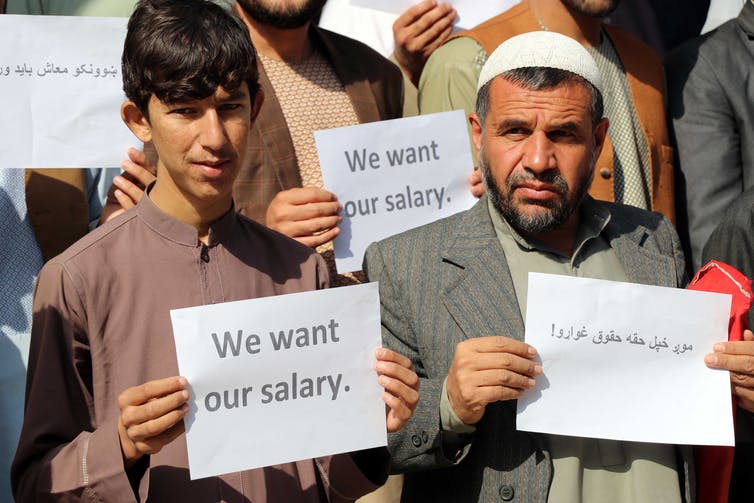By Sanzhar Aitkulov / GICJ
Twenty-three million people in Afghanistan suffer from hunger, and many more are to come as unemployment surges, education plunges, and the currency’s value plumets.
On 19 December 2021, the 17th Extraordinary Session of the Organization of Islamic Cooperation Council of Foreign Ministers took place in Islamabad. During the Session Under-Secretary-General for Humanitarian Affairs Martin Griffiths announced stated that around 23 million people in Afghanistan suffer from hunger. Malnourished children are overflowing in health facilities. In addition, 70 per cent of teachers are working without salaries; and millions of students – Afghanistan’s future – are out of school.
 The Taliban takeover and ensuing events have caused the value of the Afghani currency to drop sharply. Monetary insecurity grows because of the lack of confidence in financial sectors, affecting all opportunities to trade and to attract investment. Related to this, Mr. Griffiths mentioned the need for liquidity and stabilization of the banking system.
The Taliban takeover and ensuing events have caused the value of the Afghani currency to drop sharply. Monetary insecurity grows because of the lack of confidence in financial sectors, affecting all opportunities to trade and to attract investment. Related to this, Mr. Griffiths mentioned the need for liquidity and stabilization of the banking system.
Mr. Griffiths welcomed the decision by the World Bank's Afghanistan Reconstruction Trust Fund (ARTF) to transfer $280 million by the end of December to the UN Children’s Fund (UNICEF) and World Food Programme (WFP). ARTF is a multi-donor trust fund administered by the World Bank on behalf of 34 current and past donors. It provides on-budget financing to support the Government of the Islamic Republic of Afghanistan’s development and reform priorities, and it is the single largest source of such funding to the Government. The mandate of UNICEF in Afghanistan includes child protection, education, health, nutrition, and etc. According to August report from UNICEF, 9.700.000 children are in need of humanitarian assistance. In six districts of Balkh province, UNICEF assessed 27.700 families affected by the drought who are in need of safe water. In June, WFP assisted more than 1.7 million food-insecure people across Afghanistan. WFP delivered 16.300 mt of food, disbursed over US$ 4.7 million in cash-based transfers. Nowadays, from 41.7 million of Afghan population, 22.8 million people face acute food insecurity and 8.7 million people face emergency levels of food insecurity. By the middle of next year, universal poverty – reaching 97 per cent of the population – could be “the next grim milestone”. According to forecasts, 30 per cent of Afghanistan’s gross domestic product could be lost altogether and male unemployment may double to 29 per cent.
Along with the problems of Afghanistan, Mr. Griffiths announced partial solution of problems. “The United Nations stands firmly with you, and in solidarity with the people of Afghanistan”, said the Relief Coordinator. Next year the UN would seek its largest-ever funding appeal of $4.5 billion “to help the most vulnerable in Afghanistan”. The funding is a stopgap measure for over 21 million people who need lifesaving assistance.
Geneva International Centre for Justice (GICJ) is gravely concerned by the humanitarian crisis which besieges Afghanistan. GICJ supports the measures provided by the UN, and other state and organizations to provide humanitarian relief to the people of Afghanistan. The Taliban regime is not concerned with citizen welfare and their stronghold will continue to strain the country’s potential. The economic crisis must be addressed with long term, sustainable political decisions which cannot be enacted under the Taliban regime.
Justice, Human rights, Geneva, geneva4justice, GICJ, Geneva International Centre For Justice









